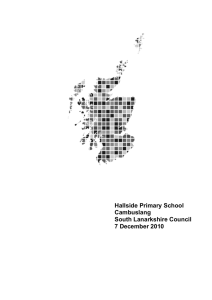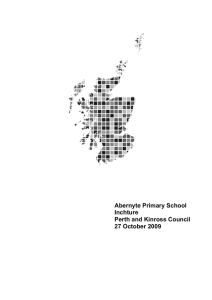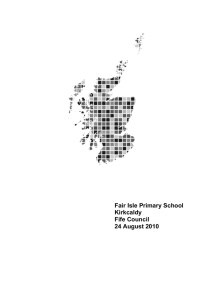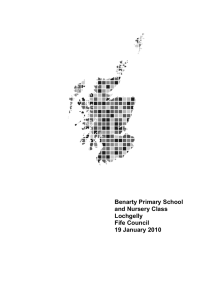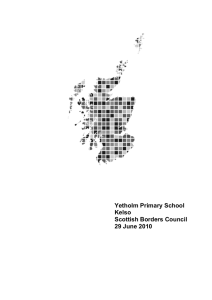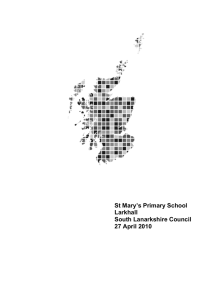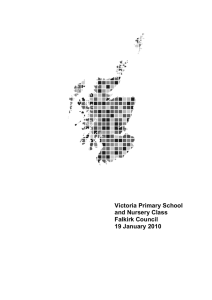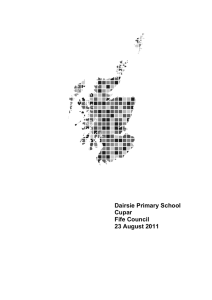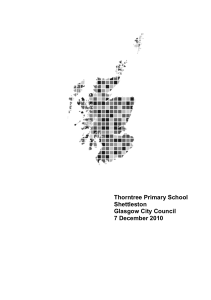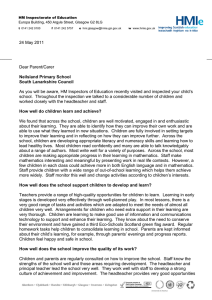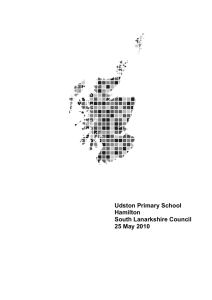Rashielea Primary School Erskine Renfrewshire Council
advertisement
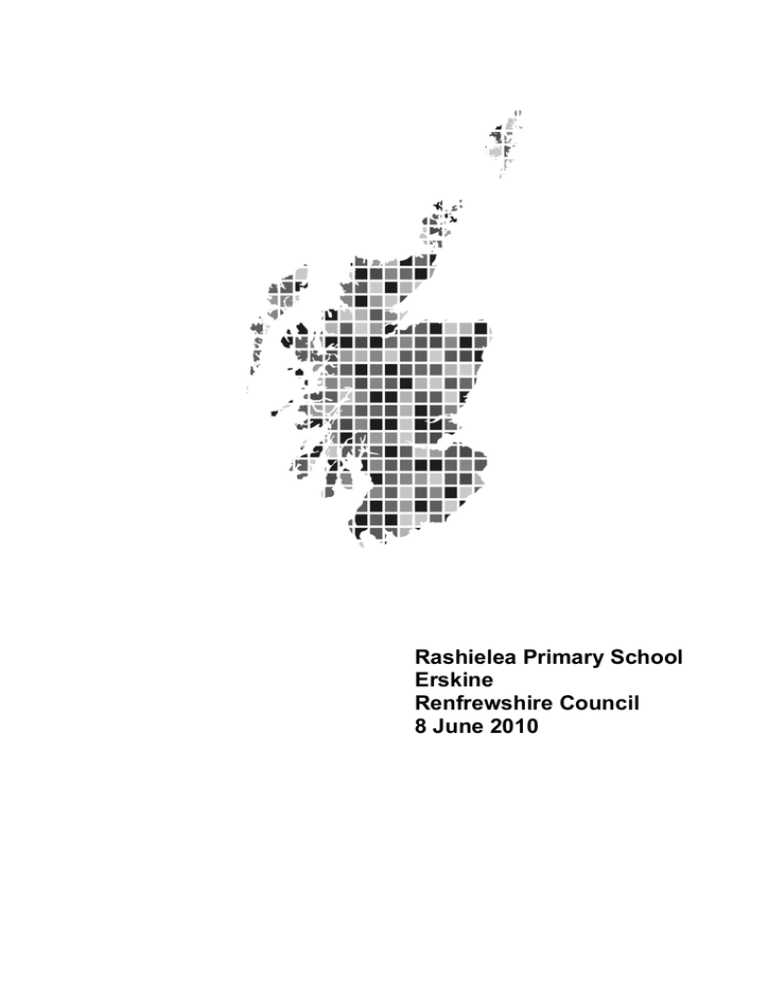
Rashielea Primary School Erskine Renfrewshire Council 8 June 2010 HM Inspectorate of Education (HMIE) inspects schools in order to let parents1, children and the local community know whether their school2 provides a good education. Inspectors also discuss with school staff how they can improve the quality of education. At the beginning of the inspection, we ask the headteacher and staff about the strengths of the school, what needs to improve, and how they know. We use the information they give us to help us plan what we are going to look at. During the inspection, we go into classes and join other activities in which children are involved. We also gather the views of children, parents, staff and members of the local community. We find their views very helpful and use them together with the other information we have collected to arrive at our view of the quality of education. This report tells you what we found during the inspection and the quality of education in the school. We describe how well children are doing, how good the school is at helping them to learn and how well it cares for them. We comment on how well staff, parents and children work together and how they go about improving the school. We also comment on how well the school works with other groups in the community, including services which support children. Finally, we focus on how well the school is led and how staff help the school achieve its aims. If you would like to learn more about our inspection of the school, please visit www.hmie.gov.uk. Here you can find analyses of questionnaire returns from children, parents and staff. We will not provide questionnaire analyses where the numbers of returns are so small that they could identify individuals. 1 Throughout this report, the term ‘parents’ should be taken to include foster carers, residential care staff and carers who are relatives or friends. 2 The term ‘school’ includes the nursery class or classes where appropriate. Contents 1. The school 2. Particular strengths of the school 3. How well do children learn and achieve? 4. How well do staff work with others to support children’s learning? 5. Are staff and children actively involved in improving their school community? 6. Does the school have high expectations of all children? 7. Does the school have a clear sense of direction? 8. What happens next? 1. The school Rashielea Primary School is a non-denominational school. It serves the town of Erskine and the surrounding area. The roll was 399 when the inspection was carried out in March 2010. Children’s attendance was in line with the national average in 2008/2009. 1 2. Particular strengths of the school • Children’s motivation and positive attitudes to learning. • Stimulating and enjoyable learning experiences which help children achieve. • Staff teamwork in improving the school. • Leadership of the headteacher. 3. How well do children learn and achieve? Learning and achievement Children are confident and eager to learn. They behave well, work hard and show pride in their achievements. Children enjoy investigating interesting topics and are stimulated to think for themselves. Most children understand what they have to do to improve their work and achieve in lessons. When they have the opportunity to assess their own and one another’s work, they offer mature and reflective comments. Children develop effectively their thinking through discussion when they work in groups. Children participate eagerly in a local authority expressive arts initiative which develops their skills in music and drama. Older children are confident in using advanced publishing and animation software. Almost all children have benefited from using the National schools’ GLOW network to hear authors, scientists and artists discuss their work. Older children use this network to access class work from home. Through the development of shared values, children have developed positive attitudes to their responsibilities for improving both the local environment and the lives of others around the world. The school’s learning links with China and the school’s success in raising 2 funds for charities have developed children’s understanding of the world and Scotland’s place in it. Children carry out this work through a range of eco school committees and the pupil council. Children have developed leadership skills through organising projects in the local environment, including upgrading school facilities and raising money for playground improvements. The popular school choir performs regularly in the community and at prestigious local authority events. The school has sustained high levels of attainment in English language and mathematics in recent years. Almost all children are making good progress in listening, talking and reading. Most are capable of making even better progress in writing. Children are developing effective communication skills and ambitious vocabulary through collaborating regularly with others in their learning. Most children are making very good progress in mathematics. Almost all children carry out oral and written calculations confidently. Most are able to solve mathematical problems effectively, using several strategies. Curriculum and meeting learning needs Staff are providing children with a suitably broad range of learning experiences. They have revised programmes and learning activities and developed many opportunities to extend children’s wider achievement. Staff have made an ambitious start to planning children’s learning taking account of Curriculum for Excellence, and provide a range of interesting interdisciplinary topics. Children have regular opportunities to develop their literacy skills through these topics and through other areas of the curriculum. There is scope to develop children’s numeracy skills in the same way. Teaching programmes for health and wellbeing, including personal safety and relationships and sexual health are well developed. Staff are reviewing their courses and programmes to provide learning experiences that ensure progression in children’s learning in all curriculum areas, taking account of Curriculum for Excellence. The school’s learning links with the local and global community and with other schools develop children’s skills in real-life contexts. Effective 3 arrangements ensure that children can continue to make progress in their learning when they transfer from pre-school providers to P1, from stage to stage within the school and from P7 into Park Mains High School. The school does not yet provide all children with two hours of good quality physical education each week. Tasks, activities and resources meet the needs of most children. Teachers give children tasks which help them to learn in different ways. In most lessons the pace is appropriate. However a few tasks lack sufficient challenge. In a few classes, teachers make effective use of their assessment of how children are achieving to ensure that they experience the support and challenge they need. This needs to become common practice across all classes. Staff identify effectively those pupils who would benefit from additional help with their learning. The support for learning teacher provides strong support to staff and children. In particular, she gives children strategies which help them to access their learning independently. Teachers work with parents, and involve children, to agree appropriate personal learning targets for those children who need these. All know and understand what they must do to assist individual children achieve their targets. Teachers provide children with regular homework to consolidate their learning. 4. How well do staff work with others to support children’s learning? Staff maintain very positive relationships with parents and take account of their views. Well-attended events enable children to display their work and achievements, and help parents to understand what their children are learning in school. The active parent-teacher association supports many school events, including the annual UNICEF ‘Day of Change’ during which the association sponsors an art competition. The school gives parents detailed information about health education, including sex education. A few parents would appreciate more regular information about how their children are getting on in school in order to support their learning more effectively at home. The school’s longstanding educational links with a school in 4 Tianjin in China have broadened children’s educational experience. Children’s environmental projects, the school choir and a recent Chinese dance initiative ensure that the school is held in positive regard in its community. Staff work closely with a wide range of partner agencies to support children. These agencies and the local authority have provided considerable help and resources to support children with specific medical needs. 5. Are staff and children actively involved in improving their school community? Almost all staff and children are involved in improving the school. Teachers and support staff take responsibility for special events and projects and teachers work together to plan the curriculum. Senior managers know the school’s strengths and what needs to be done to improve its work further. Their visits to lessons and monitoring of children’s work and teachers’ plans help teachers to improve their work. The headteacher and the support for learning teacher have been teaching alongside a few staff in a project which has supported them effectively to develop new learning and teaching approaches. The school plans to provide more opportunities for teachers to share their ideas and take on responsibilities within the curriculum. The headteacher is making good use of her own knowledge and skills to provide staff training. Recently, staff have begun to develop more reflective evaluations of their own lessons and children’s learning. Senior managers need to develop further staff involvement in school self-evaluation. Through taking leading roles in the school’s many committees and projects, children are developing their skills in planning, organising and making important decisions. The school has appropriate arrangements in place to deal with enquiries and complaints. 6. Does the school have high expectations of all children? The school is characterised by positive and supportive relationships 5 amongst children and between children and staff. Staff have high expectations of children’s achievement and behaviour, and use praise and reward assemblies effectively to encourage children to be ambitious in their learning. Staff handle sensitive situations and any concerns about children’s welfare caringly. There are appropriate and well-understood procedures in place to ensure the protection of children. Catering staff need further training in child protection. Almost all children have confidence in the school’s measures to prevent bullying and they feel that children get on well with each other. There are appropriate arrangements for religious observance. Through their topics, the inclusive nature of the school and its international links, children learn about equality and diversity in society. 7. Does the school have a clear sense of direction? The headteacher provides strong and effective leadership. Her sound understanding of curriculum development and effective practice in education has helped staff to improve the school. She has been successful in building positive relationships. The senior management team work well together, with a focus on improving children’s learning experiences. Teachers are beginning to lead developments and share their ideas. Senior managers plan to continue to develop the school as a place where everyone, including teachers, is learning and improving. 8. What happens next? As a result of the very good quality of education provided by the school, we will make no further visits in connection with this inspection. The education authority will inform parents about the school's progress as part of the authority’s arrangements for reporting to parents on the quality of its school. 6 We have agreed the following areas for improvement with the school and education authority. • Ensure that the pace of, and challenge in, all lessons meets the needs of all children. • Review courses and programmes as planned to ensure children continue to make good progress in their learning. In particular, make arrangements to provide all children with two hours of good quality physical education each week. • Continue to involve staff in discussing their work, sharing best practice and in developing their leadership for learning role. Quality indicators help schools and nursery classes, education authorities and inspectors to judge what is good and what needs to be improved in the work of a school and a nursery class. You can find these quality indicators in the HMIE publications How good is our school? and The Child at the Centre. Following the inspection of each school, the Scottish Government gathers evaluations of three important quality indicators to keep track of how well all Scottish schools and nursery classes are doing. Here are the evaluations for Rashielea Primary School. Improvements in performance Learners’ experiences Meeting learning needs very good very good good We also evaluated the following aspects of the work of the school. The curriculum Improvement through self-evaluation HM Inspector: Jacqueline Sinclair 8 June 2010 7 good good When we write reports, we use the following word scale so that our readers can see clearly what our judgments mean. excellent very good good means means means satisfactory weak unsatisfactory means means means outstanding, sector leading major strengths important strengths with some areas for improvement strengths just outweigh weaknesses important weaknesses major weaknesses If you would like to find out more about our inspections or get an electronic copy of this report, please go to www.hmie.gov.uk. Please contact us if you want to know how to get the report in a different format, for example, in a translation, or if you wish to comment about any aspect of our inspections. You can contact us at HMIEenquiries@hmie.gsi.gov.uk or write to us at BMCT, HM Inspectorate of Education, Denholm House, Almondvale Business Park, Almondvale Way, Livingston EH54 6GA. Text phone users can contact us on 01506 600 236. This is a service for deaf users. Please do not use this number for voice calls as the line will not connect you to a member of staff. You can find our complaints procedure on our website www.hmie.gov.uk or alternatively you can contact our Complaints Manager, at the address above or by telephoning 01506 600259. Where the school has a nursery class, you can contact the Complaints Coordinator, Headquarters, Care Commission, Compass House, Riverside Drive, Dundee DD1 4NY, telephone 0845 603 0890. Crown Copyright 2010 HM Inspectorate of Education
